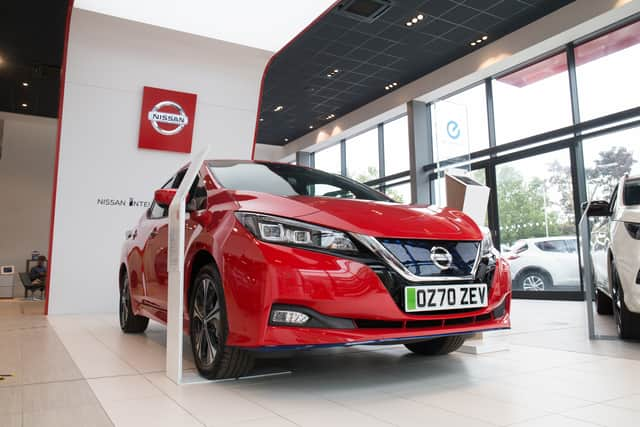Is 2030 petrol and diesel car ban being scrapped? What Rishi Sunak and Michael Gove said about net zero policy


The ban on the sale of new petrol and diesel cars from 2030 will not be changed, the government has insisted, amid speculation that it could be scrapped.
On Tuesday morning Cabinet minister Michael Gove said that the deadline for the ban was "immovable" even as the government appeared to be considering weakening its net zero policies.
Advertisement
Hide AdAdvertisement
Hide AdQuestions over the policy's future were raised on Monday after a government minister appeared to suggest the policy was under consideration before backtracking on his comments and the Prime Minister failed to commit to the current date.
During a round of interviews with broadcasters, Andrew Mitchell - a Foreign Office minister - said that with regard to the 2030 ban he couldn’t “prophesise for the future” and told Times Radio “I think the important thing is to wait for any announcement from the government.”
But after further questions around the issue he said that the policy had not changed. Asked on BBC Radio 4’s Today programme if the ban on the sale of new petrol cars from 2030 is still in place, Mr Mitchell said: “It absolutely is," adding "and will remain in place.”
On Tuesday morning Housing Secretary Michael Gove told Times Radio that the deadline for the ban deadline would not be put back. Asked on Times Radio if it was “immoveable”, he replied: “Yes.”
Advertisement
Hide AdAdvertisement
Hide AdHe later told BBC Radio 4’s Today programme: “We’re committed to maintaining our policy of ensuring that by 2030 there are no new petrol and diesel cars being sold. I’m sure there are some people who would like to change that policy, I understand. But that policy remains.”
A spokesman for Prime Minister Rishi Sunak also said the 2030 deadline "remains our commitment" after Sunak himself refused to explicitly recommit to the ban.
Asked after Mitchell's interviews whether he is continuing with the target for banning new fossil fuel car sales, Mr Sunak insisted: “We’re going to make progress towards net zero but we’re going to do that in a proportionate and pragmatic way that doesn’t unnecessarily give people more hassle and more costs in their lives – that’s not what I’m interested in and prepared to do.”
But he was not clear whether the 2030 deadline will stay in place or whether exemptions for smaller car manufacturers - the so-called “Aston Martin exemption” - could be added.
Advertisement
Hide AdAdvertisement
Hide AdAfter his comments, the Prime Minister's official spokesman told reporters: “That [the 2030 ban] remains our commitment. I think as you heard from the Prime Minister this morning, what we want to do is ensure that this approach is proportionate and pragmatic and doesn’t unfairly impact the public. I think that’s what the public and indeed businesses would expect. But obviously the the 2030 approach remains our commitment.”
The official added: “It is right that if the situation changes and new technology evolves that we keep our approach under review and make sure that it is the right one. Equally at a time of global high inflation, which is hitting the public hard, we need to make sure that we’re getting the balance right.”
The 2030 ban will stop the sale of all new cars and light vans powered purely by petrol or diesel engines. Sales of hybrid models with can travel "significant distances" on eletric power alone will be allowed to continue until 2035. However, the government also plans to introduce an EV mandate from next year that will require at least 22% of all car makers' UK sales to be zero-emissions vehicles.


It has been suggested that the ban should be pushed back or exceptions made as the government faces challenges on how its net zero policies will affect households dealing with the cost of living crisis.
Advertisement
Hide AdAdvertisement
Hide AdSome Tory MPs have called for a “rethink” over the speed at which net-zero goals are pursued, including the 2030 ban, which the government says puts the UK on course to be the fastest G7 country to decarbonise cars and vans.
The comments come after the anger over London’s ULEZ extension was partly credited with the Tories winning the Uxbridge by-election.
However, those involved in the UK's electric car industry warned against any softening of the ban. Melanie Shufflebotham, co-founder and COO of charger mapping service Zapmap said: “The country’s future climate commitments should not be a political football, especially when the signs of global heating are so visible today. Road transport accounts for around 20% of all our emissions, and electric vehicles are a proven technology solution.
"The 2030 ban on sales of new petrol and diesel cars has given business the confidence to invest — an entire industry is working towards meeting this deadline and it is well within reach. The government must be like a handbrake-less electric car, and not roll back.”
Advertisement
Hide AdAdvertisement
Hide AdA spokesperson for ChargeUK, which represents public charging operators, added: “The phase out of petrol and diesel vehicles from 2030 will be gradual. If government fails to stand firm to its commitments this investment and the supply of EVs entering the market will be at risk."
Comment Guidelines
National World encourages reader discussion on our stories. User feedback, insights and back-and-forth exchanges add a rich layer of context to reporting. Please review our Community Guidelines before commenting.
